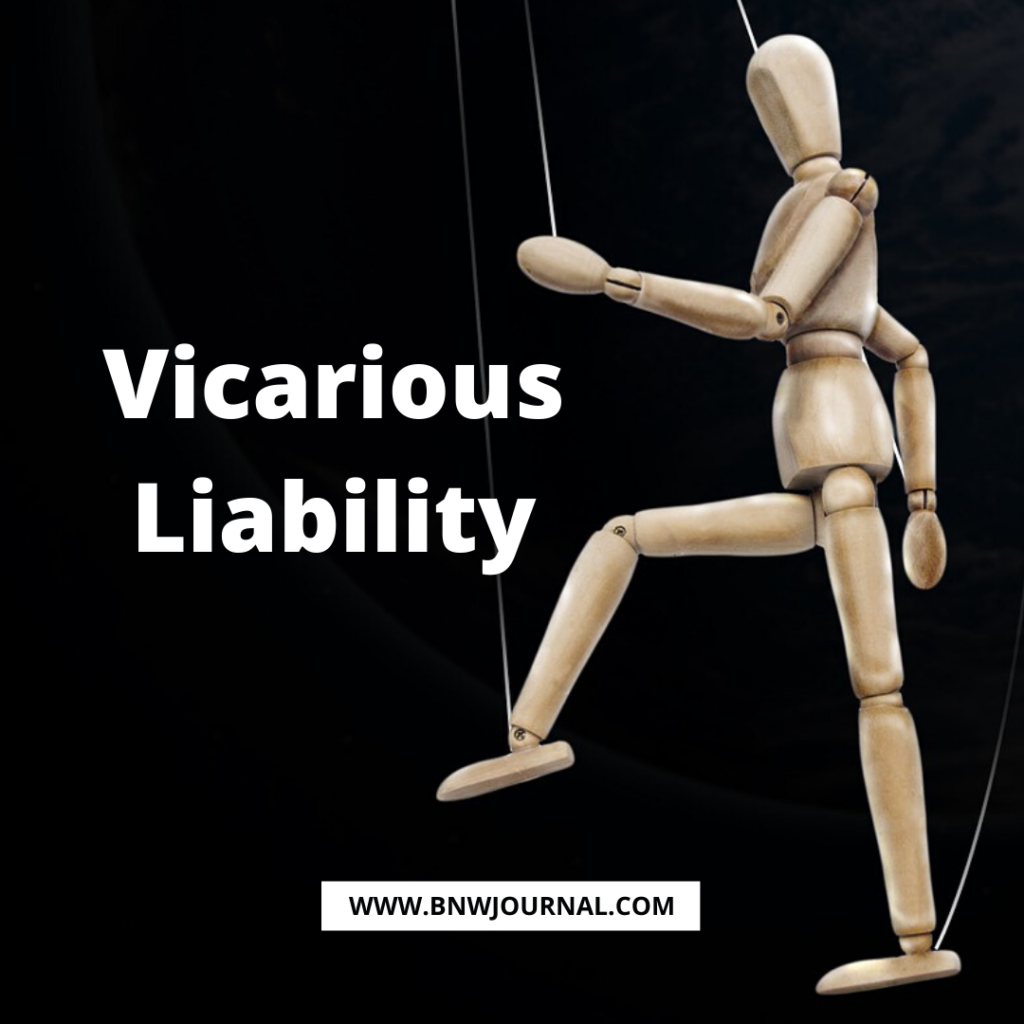![]()
“The imposition of liability on one person for the actionable conduct of another, based solely on a relationship between the two persons. Indirect or imputed legal responsibility for acts of another; for example, the liability of an employer for the acts of an employee, or, a principal for torts and contracts of an agent.”[1]
Black’s Law Dictionary

Introduction
Primarily, it is the liability impose upon the Principal when the agent fails to exercise due to reasonable care while performing the task allot by the Principal. For vicarious liability, the employee/agent shall be in the due course of employment when he commits a wrongful act. This is also call as impute negligence.
Such a type of liability can be incurred in three ways
- When a person ratifies or authorizes a particular act: The legal maxim of Qui facit per alium facit per se applies here. It means that he, who does an act through another, does it himself. When a person ratifies a certain act, he gives his assent to its commission. Hence is bound by it. There are certain prerequisites of such ratification. The act shall be on behalf of and with the full knowledge of the other person. The person ratifying the work must be in capacity of doing it himself. The act which is ratified is illegal and void.
- When a person is in a dominant position: These are the various types of relationships wherein the one person can be made liable for the actions of the other:
- Master and Servant: A master’s liability arises owing to the nature of subsisting relations with the servant. The wrongful act shall be by the servant while following the specific order of master. This sort of wrong may consist of excess or mistaken execution of a lawful authority. In contrast, it may also be a willful wrong with the intention of serving the master’s purpose.
- Owner and Independent Contractor: Generally, an employer is not liable for the acts of an independent contractor. However, there are a few exceptions to this rule. The owner is liable when the work to be perform is unlawful in itself. The owner is also liable if he/she exercises directional control over the independent contractor. If there is a legal obligation on the employer to carry out an action efficiently, he is liable for the mistakes of his independent contractor in the course of this act. The employer can also be made liable in cases where there is implied liability or commission of wrong results into an absolute liability.
- Principal and Agent: A principal is liable for the acts commit by the agent in the course of employment, even if those were not authorize by the Principal. In cases where the wrongful act committed by the agent was beyond the scope of the agency but was subsequently ratified by the Principal, the latter can be made liable for the same. An agent is different from an independent contractor. Independent Contractor is hire to do a specific act and fulfills his obligations in an individual capacity. On the other hand, an agent acts on behalf of the principal.
- Firm and its partners: Partners of a firm are vicariously liable to the third party for the wrongful acts commit by their fellow-partners in the ordinary course of the partnership business. All the partners are to be consider as acting jointly for the purpose of business. Hence, partners can be sue jointly or severely.
- When a person abets the wrongful act: When a person instigates others to perform a tortuous act, the former can be liable. The circumstances of the case shall be such that one person knowingly induces another to commit a wrongful act. The abettor may also use illegal means against a third party or procure a breach of contract with malicious intent.
Acts of State
The State can also be liable for the acts commit by the authorities in their course of employment. Nevertheless, the State cannot be liable for any acts commit during the discharge of sovereign functions. This is the Doctrine of Sovereign Immunity. Vicarious liability is based on the principle of ‘Respondeat Superior’.
It means that the employer shall be made liable for the wrongful acts committed in the course of employment because he/she is in a better position to compensate. Moreover, the employer has the power of selection of the employee. The employee can also be suspend at the desire of the employer.
Conclusion
The vicarious liability is only imposed when directional control is exercised by the principal. In the pursuance of principles of justice, equity, and good conscience, it is essential to make the principal/ employer liable for the acts committed by the employees.
References:
[1] Garner, B. (Ed.). (2019). Vicarious liability. In Black’s Law Dictionary (11th Edition). Retrieved from https://epdf.pub/queue/blacks-law-dictionary.html



0 Comments